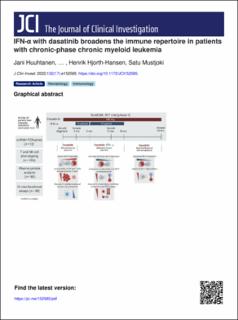| dc.contributor.author | Huuhtanen, Jani | |
| dc.contributor.author | Ilander, Mette | |
| dc.contributor.author | Yadav, Bhagwan | |
| dc.contributor.author | Dufva, Olli M.J. | |
| dc.contributor.author | Lähteenmäki, Hanna | |
| dc.contributor.author | Kasanen, Tiina | |
| dc.contributor.author | Klievink, Jay | |
| dc.contributor.author | Olsson-Strömberg, Ulla | |
| dc.contributor.author | Stentoft, Jesper | |
| dc.contributor.author | Richter, Johan | |
| dc.contributor.author | Koskenvesa, Perttu | |
| dc.contributor.author | Höglund, Martin | |
| dc.contributor.author | Söderlund, Stina | |
| dc.contributor.author | Dreimane, Arta | |
| dc.contributor.author | Porkka, Kimmo | |
| dc.contributor.author | Gedde-Dahl, Tobias | |
| dc.contributor.author | Gjertsen, Bjørn Tore | |
| dc.contributor.author | Stenke, Leif | |
| dc.contributor.author | Myhr-Eriksson, Kristina | |
| dc.contributor.author | Markevärn, Berit | |
| dc.contributor.author | Lübking, Anna | |
| dc.contributor.author | Dimitrijevic, Andreja | |
| dc.contributor.author | Udby, Lene | |
| dc.contributor.author | Bjerrum, Ole Weis | |
| dc.contributor.author | Hjorth-Hansen, Henrik | |
| dc.contributor.author | Mustjoki, Satu | |
| dc.date.accessioned | 2023-01-13T10:33:49Z | |
| dc.date.available | 2023-01-13T10:33:49Z | |
| dc.date.created | 2022-11-09T09:11:52Z | |
| dc.date.issued | 2022 | |
| dc.identifier.citation | Journal of Clinical Investigation. 2022, 132 (17), . | en_US |
| dc.identifier.issn | 0021-9738 | |
| dc.identifier.uri | https://hdl.handle.net/11250/3043318 | |
| dc.description.abstract | In chronic myeloid leukemia (CML), combination therapies with tyrosine kinase inhibitors (TKIs) aim to improve the achievement of deep molecular remission that would allow therapy discontinuation. IFN-α is one promising candidate, as it has long-lasting effects on both malignant and immune cells. In connection with a multicenter clinical trial combining dasatinib with IFN-α in 40 patients with chronic-phase CML (NordCML007, NCT01725204), we performed immune monitoring with single-cell RNA and T cell receptor (TCR) sequencing (n = 4, 12 samples), bulk TCRβ sequencing (n = 13, 26 samples), flow cytometry (n = 40, 106 samples), cytokine analyses (n = 17, 80 samples), and ex vivo functional studies (n = 39, 80 samples). Dasatinib drove the immune repertoire toward terminally differentiated NK and CD8+ T cells with dampened functional capabilities. Patients with dasatinib-associated pleural effusions had increased numbers of CD8+ recently activated effector memory T (Temra) cells. In vitro, dasatinib prevented CD3-induced cell death by blocking TCR signaling. The addition of IFN-α reversed the terminally differentiated phenotypes and increased the number of costimulatory intercellular interactions and the number of unique putative epitope-specific TCR clusters. In vitro IFN-α had costimulatory effects on TCR signaling. Our work supports the combination of IFN-α with TKI therapy, as IFN-α broadens the immune repertoire and restores immunological function. | en_US |
| dc.language.iso | eng | en_US |
| dc.publisher | American Society for Clinical Investigation | en_US |
| dc.rights | Navngivelse 4.0 Internasjonal | * |
| dc.rights.uri | http://creativecommons.org/licenses/by/4.0/deed.no | * |
| dc.title | IFN-α with dasatinib broadens the immune repertoire in patients with chronic-phase chronic myeloid leukemia | en_US |
| dc.title.alternative | IFN-α with dasatinib broadens the immune repertoire in patients with chronic-phase chronic myeloid leukemia | en_US |
| dc.type | Peer reviewed | en_US |
| dc.type | Journal article | en_US |
| dc.description.version | publishedVersion | en_US |
| dc.source.pagenumber | 17 | en_US |
| dc.source.volume | 132 | en_US |
| dc.source.journal | Journal of Clinical Investigation | en_US |
| dc.source.issue | 17 | en_US |
| dc.identifier.doi | 10.1172/JCI152585 | |
| dc.identifier.cristin | 2070951 | |
| cristin.ispublished | true | |
| cristin.fulltext | original | |
| cristin.qualitycode | 2 | |

